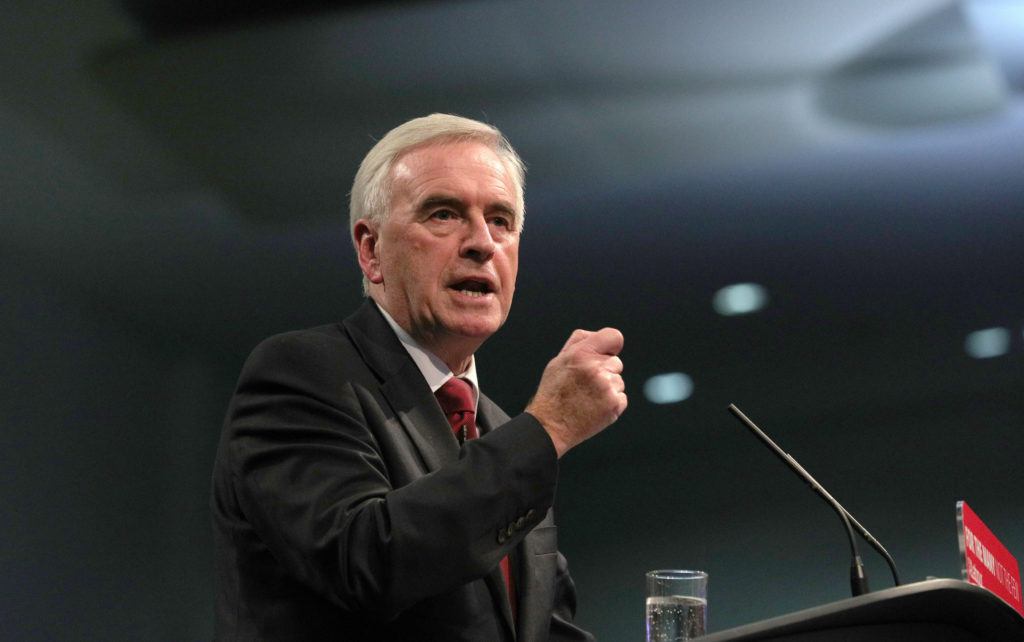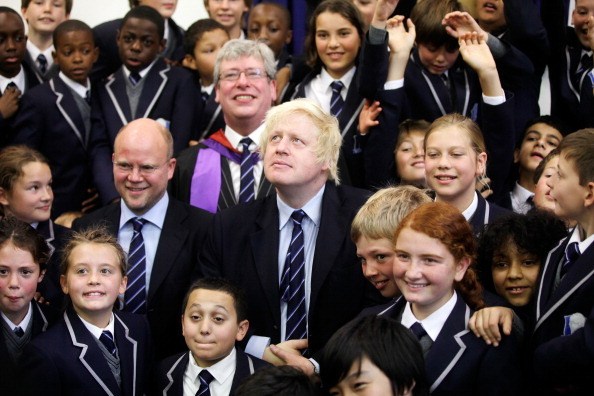Toby Young (left, next to Boris Johnson at the opening of the West London Free School) has been attacked by the left with little consideration of truth or accuracy. Credit: Matthew Lloyd/Getty Images

Thirty years ago the American novelist Saul Bellow observed that when public morality becomes a ghost town anyone can ride in and call themselves sheriff. Both in Britain and America there are plenty of people currently auditioning for the role of sheriff. But what is presently hampering – and will continue to hamper – all such efforts is the problem that led to the creation of the ghost town in the first place. Prominent among these is the situation which the Irish writer Kevin Myers summed up in his memoir of the Troubles in Northern Ireland: that we have reached the place where “the truth is whatever you’re having yourself”. Any attempt to rediscover a shared public morality in our societies must start with addressing these twin challenges.
The first is that the landscape has been cleared of any and all recognised moral authorities. Whether they were the right receptacle of moral judgement or not, until very recently the churches owned most of this terrain. The law dealt with the issue of what was illegal, and the churches preached the manners and morals which guided everything underneath. Today that voice is pleading and fragile where it exists at all. Most often it sounds as though it is trying to catch up with – and cling onto – a new truth rather than bringing a truth of its own into the public arena. What moral issue in Britain today does anybody seriously suggest that the Church of England could solve? And in the absence of the church what vessels are there from which the public at large would be willing to take moral guidance?
Until the very recent past we might have said that there were individuals – respected public figures whose actions or track record accorded them respect and who as a result had a right to be listened to when they spoke of moral matters or just lived lives of moral example. But the idea of such unifying figures of respect may also be a vessel which we will have to give up on. Just one of the effects of social media and the age of transparency is that such people are unlikely to be produced. Human flaws that were once private matters are now publicly announced. Everybody does something disreputable in their lives and in the age of Twitter reputations can not only fall in a moment but a mistake – however long ago it was made – always lies before you, and is available for everybody else to discover or discover anew at the tap of a button.
What is more, those figures from the recent past who were respected, and whose moral judgements or moral lives might have been admired or emulated, enjoyed a generational advantage (which they of course would not have seen in such terms). As the American sociologist Jonathan Haidt has observed, to a great extent America and Britain have spent recent decades living on the unifying moral capital accumulated from our nations’ victories in World War II. That included anybody who had lived through that period and been seen to play any part in it. Barring any similar societal threat it is unlikely that such moral capital will be accumulated – and respected across any and all spectrums – in the current generation.

The second problem which exacerbates the phenomenon of the ghost town is the difficulty of people being willing to agree on any ‘truth’. Recent campaigns in Britain by the political left have exemplified this, but then the left might well say the same of the political right and provide examples of their own. Nevertheless, efforts over the last fortnight to halt the appointment of the journalist and Free Schools advocate Toby Young to membership of the 15-person Office for Students board consisted of a campaign of untruthfulness straight out of the new left’s playbook. Young was falsely accused of the trinity of current worst-crimes: racism, sexism and homophobia. In the same period Virgin trains announced that they would no longer sell the Daily Mail on their train services because they felt that the paper (which Virgin accused of the exact same trinity of crimes) was not ‘compatible’ with its company values.
None of the resulting fallout in either case allowed the truth to play any role, let alone have any chance of triumphing. Indeed truth was not even a defence. The Labour MP Dawn Butler, Liberal Democrat leader Vince Cable and others paid no attention to the facts in the Toby Young case. Indeed they were not even remotely detained by them. They had a political battle to win and were happy to grab any tools that came to hand. These are learning moments.
In the US a segment of the political right has chosen to reply to such tactics by playing them back in kind. The ‘alt-right’ among others have chosen to take the same attitude towards untruth as their political opponents. If the left calls all of its enemies homophobes, misogynists and racists then that part of the right will reply with false accusations of their own. In the UK the most that parts of the right have chosen to do is to try to play the left by their own rules. So when the left says ‘Toby Young’ the right replies ‘Jared O’Mara’. When the left says ‘Daily Mail misogyny’ the right says ‘John McDonnell’s views on Margaret Thatcher’. To date they have not begun to simply make things up about their political opponents. But they have decided to pretend to accept aspects of the left’s new morality, the better to highlight failures on their own side and as a result demonstrate some element of hypocrisy.
Unfortunately there is no certainty that even this portion of social hygiene will be maintained. An increasing urge to fight fire with fire may well lead to the right being willing to make things up about people on the political left, and issue smears and denunciations of their own, based on existing taboos or the invention of new ones.
Anybody with a concern about social and political hygiene in general should of course strongly oppose any such trend. But only three things can help us begin to avoid such a Mexican gunfight and instead start to mould some agree-upon standards.
The first is to be aware of the tendency to apply different standards to your own side than to that of your opponents and to try to resist the urge.
The second is to listen to – and consider – the case for the defence and to try not to put the worst interpretations on things solely because they happen to have come from a political opponent.
And the third is to recognise that if human forgiveness and redemption are possible on one side then they must also be possible on the other. If something said by an opponent five years ago can be forgivable then something said by a friend five years ago must be forgivable too. It does not mean that all things said five years ago are to be ignored. But certainly a sincere expression of regret by a political opponent must be capable of being accepted as willingly as a sincere expression of regret by a friend can be.
In an age where we are seeing the politicisation of absolutely everything – from the entertainment industry to every aspect of daily life – some of this will prove a tall order. Nevertheless we must find some places to start. Not as a means to agree on the sheriff. But at the very least to begin to repopulate this ghost town.










Join the discussion
Join like minded readers that support our journalism by becoming a paid subscriber
To join the discussion in the comments, become a paid subscriber.
Join like minded readers that support our journalism, read unlimited articles and enjoy other subscriber-only benefits.
Subscribe